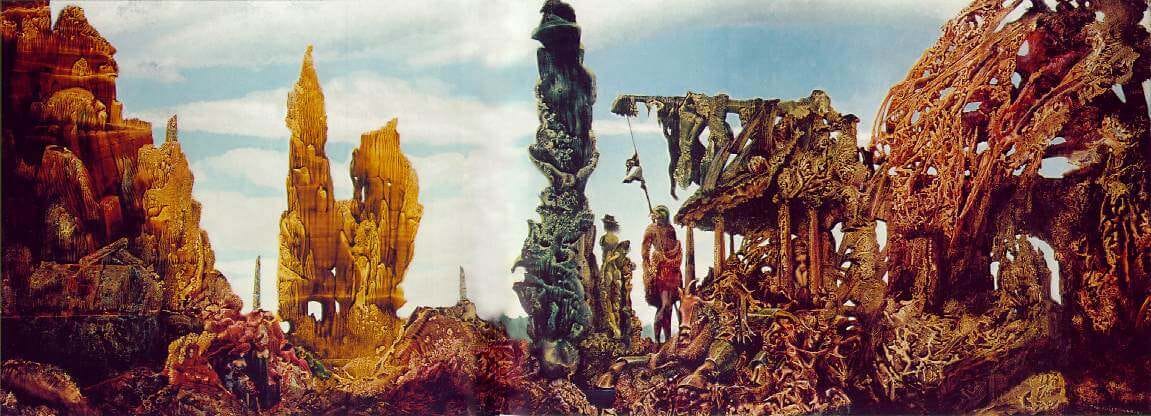When the Horror is Everywhere
I find myself at a Starbucks only under unfortunate circumstances—such as on Thanksgiving morning, after I decided to walk off an argument with my girlfriend and the local Starbucks was the only place open. Or the time I returned from Japan, landed at Denver airport, and ordered a cappuccino, forgetting the quality difference between Starbucks in Japan and America. That first sip sent me down a spiral about all the life choices that had led me there. The last time I was at a Starbucks was when I had to pee. I stood at the counter at a Houston location and observed the drinks being prepared—large plastic containers of white cream, froth, and some kind of pink viscous liquid infused with coffee. Most people walked out with multiple drinks and drove away in their eight-miles-per-gallon Ford trucks.
I was not surprised at all when Starbucks announced the opening of the first 3D-printed Starbucks location in Brownsville, Texas—a building that looks like a blob of dried up dog shit, complete with little twirls and all. It seemed appropriate that the place serving up slop is also housed in slop. The descriptions just say "first 3D printed Starbucks." There is no authorship. No architect is taking credit for this. All the genius of mankind is attributed to humans, and all that is slop is attributed to faceless machines, as if spit out from the void beyond.
Slop Horror is everywhere in the environment. It is in the poor quality of new-build apartments constructed to match the code but unfit for living, like the now banned windowless apartments in Austin. It bleeds into relationships in the form of therapy-speak, where people sublimate their ego to a cloud of concepts and words without listening to others or themselves. It is in Mr. Beast thumbnails designed to appeal to the widest possible audience, hence featuring the expression of a 35-year-old man pretending to be an infant. If Athletic Greens is optimization slop, then imitation meat is sustainable slop. Slop Horror is watching your friend descend into madness from consuming manosphere content.
Luxury and artificial scarcity are the shadows of slop, and so the increase in mentions of slop has coincided with an interest in quiet luxury and what
calls the Boom Boom aesthetic. Acquiring something few people have is dreaming of the void—being among the select few to possess something special, like a Birkin bag or the latest sneaker drop. Luxury makes you feel special amidst the outgrowth of slop around you.The Overloaded Man
J.G. Ballard wrote about the horrors of slop long before there were LLMs. In Venus Smiles, a museum curator is presented with a sonic sculpture made of steel. The sculpture emits noises, and the curators discover it is growing and taking over the museum garden. As it begins to engulf the museum building itself, the curators decide to melt the sculpture. The story ends with the curator discovering that the melted sonic sculpture was mixed with regular steel and used to build the new courthouse in the city. The material is everywhere now, and it has only begun its takeover of the environment.
Slop is ubiquitous in environments where we have sublimated our desires to various machines—technological, bureaucratic, or ideological. It is the outcome of a misdirected search for what Lacan would call Das Ding – something longed for but unattainable. For Lacan, Das Ding represents an irreparable void around which our desires orbit, always approached but never reached. Sublimation of a desire is constructive when it preserves tension, acknowledging the gap and channeling desire around it. Slop oozes out when this tension collapses, when desire is projected onto something external—a fetishistic replacement masquerading as the genuine article. The machine, bureaucracy, or consumer product becomes mistaken for the lost object itself (From an LLM conversation).
Forgetting slop or turning your eye away from it is horror of its own kind. In another Ballard short story, The Overloaded Man, a professor rage-quits his job and develops the ability to reduce physical objects around him into abstract lines and Piet Mondrian-esque paintings. His friend tells him, "You can't turn a blind eye to the world. The subject-object relationship is not as polar as Descartes' Cogito ergo sum suggests. By any degree to which you devalue the external world, you devalue yourself. It seems to me that your real problem is to reverse the process," which is reminiscent of the countless writings about quitting the internet, not using your smartphone, or human-approved art. Slop Horror is using a dumb phone and posting about it online. Slop Horror is generating proof that your work was not produced by AI, repeating mundane steps over and over again, like you are a physical version of a captcha.
Don't turn your eye away from the slop. As Werner Herzog says in an interview where he mentions watching WrestleMania, "The poet should not look away from the world."
Buy my book of shorts Thinking About Leaving or subscribe to support my work.




